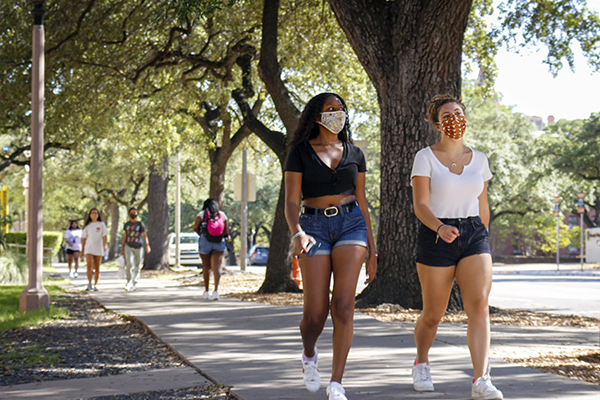What does lifting the mask mandate mean for Texas businesses?
March 12, 2021
Editor’s Note: This story first appeared in The Daily Texan’s March 9 print edition.
Businesses and public places must independently decide to set mask mandates and capacity limits after Gov. Greg Abbott’s executive order lifting the statewide mask mandate takes effect Wednesday.
Abbott’s order advises individuals to follow Texas Department of State Health Services recommendations, which advises people to wear a mask whenever it is not possible to maintain a six-foot distance from others and discourages gatherings over 10 people. However, there can be no penalty by law for those who do not wear masks in public places. The DSHS has not updated its advice page since the executive order.
“Individuals are strongly encouraged to wear face coverings over the nose and mouth … but no person may be required by any jurisdiction to wear or to mandate the wearing of a face covering,” according to the executive order.
The executive order said county judges in areas where COVID-19 hospitalizations make up over 15% of their total hospital capacity for seven days can place capacity restrictions on businesses up to 50%. But judges cannot enforce mask mandates by law.
Austin is currently at a stage four risk level set by Austin Public Health, meaning all businesses are recommended to operate at 25% to 50% capacity. On Wednesday, this capacity cannot be legally enforced under the executive order. Businesses, including restaurants and bars, can make personal decisions to require masks, according to the executive order.
Bryce Riggle, an arts and entertainment technologies freshman, said he is concerned about dining locations being fully open since people are not always wearing masks.
“Any space where you have to take your mask off for some period of time is problematic,” Riggle said.
Mechanical engineering junior Michael Esposito said he believes it makes sense to keep the mask mandate in place if businesses are to successfully reopen.
“I wouldn’t be opposed to reopening businesses assuming that we had the blessing of epidemiologists to say we can do it without exploding new COVID-19 cases,” Esposito said.
Public schools are encouraged to follow the guidance of the Texas Education Agency, according to the executive order. Private institutions are recommended to establish similar practices but cannot be required to follow guidelines.
Cities cannot impose limits on public or private universities, religious services or child care facilities, regardless of hospitalization levels in their area, according to the executive order.
Nursing homes and assisted living facilities are advised to follow the guidance of the Texas Health and Human Services Commission. Facilities should minimize the movement of staff between buildings, according to the executive order.
County and municipal jails must follow the Texas Commission on Jail Standards for visitations and operations in facilities, according to the executive order.
Austin Mayor Steve Adler said, in a news conference last Wednesday, that individuals should support businesses being vigilant about COVID-19 safety.
“I think we should be honoring and patronizing and holding up those businesses that are going the extra mile to keep their customers and their employees safe,” Adler said.












